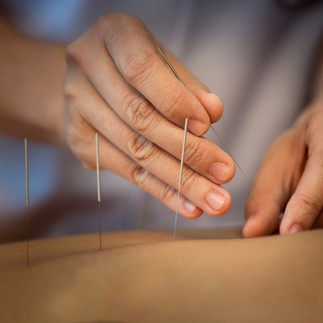
Harmonia Career Guide to Acupuncture
2
13
0

Introduction
Acupuncture is a traditional Chinese medicine practice that has been used for thousands of years. It involves the insertion of thin needles into specific points on the body to promote healing and balance.
As more individuals seek alternative therapies for various ailments, the interest in acupuncture has surged. This ancient practice is known for its ability to alleviate pain, reduce stress, and enhance overall wellbeing.
If you are intrigued by the principles of holistic health and wish to explore a career in acupuncture, understanding the necessary qualifications, skills, and opportunities is essential.
What is acupuncture?
Acupuncturists treat common problems such as back pain, neck pain and joint pain. It is thought to influence energy flow in the area of the body where the needles are inserted. It can stimulate the immune system, promote circulation, produce natural healing substances in the body, relieve pain, help with stress, and improve our overall wellbeing.
As an acupuncturist you'll take a holistic approach to treatment, looking at the individual rather than just their symptoms.
Traditional Chinese acupuncture is based on the belief the flow of Qi (vital energy) can be naturally restored through specific pathways (meridians) in your body.
Western medical acupuncture (dry needling) follows the same principles of traditional acupuncture and involves stimulating nerves, muscles and connective tissue that lie under the skin, often following a medical diagnose to relieve pain.
How to become a qualified acupuncturist
There is no statutory regulation for acupuncture in the UK, however, but it's very important to be properly trained and qualified to ensure your practice is safe.
Regulation
Although registration is voluntary, it is recommended that you join an association, such as the British Acupuncture Council (BAcC) - the UK’s largest professional body for traditional acupuncturists - which holds an accredited register with the Professional Standards Authority (PSA).
Related Read: What is Professional Registration?
Training
You will need to complete a specialist course, which can vary in length and level of qualification, but are usually degree level or equivalent. You will study Chinese medicine theory along with physiology, anatomy and other western medical sciences, as well as undertake observation and training in a clinical setting.
Accredited courses can be found with the British Acupuncture Accreditation Board (BAAB) to guarantee excellence in training, safe practice and professional conduct.
If you're already a qualified healthcare professional, you could train in acupuncture with the British Medical Acupuncture Society. As a trained member, you can use acupuncture in your professional practice.
Professional Registration
Membership with a professional body can enhance your credibility and open networking opportunities, vital for building a career. Many professional associations will support you with finding the right insurances and licencing, such as professional liability insurance which is essential for practicing safely.
CPD (Continuing Professional Development)
After your initial training, ongoing education to ensure best practice is vital. Engaging in CPD activities—such as workshops, events or online courses—can keep you informed about the latest practices and techniques.
How to gain practical experience
Gaining practical experience in acupuncture is essential for developing your skills and understanding the nuances of this ancient practice. Here are some effective ways to achieve this:
Internships and Placements:
Seek internships or trainee placements at wellness centres, spas, private practices or local hospitals. Many acupuncture training programmes include clinical internships where students can practice under supervision.
Seek Mentorship:
Find an experienced acupuncturist willing to mentor you and share their knowledge and techniques. You could also shadow licensed acupuncturists in their practice to observe techniques and patient interactions.
Practice with Friends and Family:
Start by offering free services to friends and family to build your confidence and skills.
Working as an acupuncturist
The landscape of acupuncture in the UK presents several different opportunities for practitioners. You can choose to work independently or within established facilities.
Setting Up a Private Practice
If being self-employed is for you, consider these options for your practice:
Home-Based Practice:
This option allows you to minimise overhead costs. Create a welcoming atmosphere in your home to attract clients seeking a comfortable environment.
Offer Mobile Services:
Offering sessions at clients' homes can widen your client base. According to a survey, 45% of individuals prefer in-home treatments for added convenience.
Partnerships with Wellness Centres:
Collaborating with spas or holistic clinics can provide a steady stream of clients while positioning you as a professional in an established setting.
Employment Opportunities
If you prefer a traditional workplace, numerous roles are available, including:
Spas and Wellness Centres:
These facilities often hire practitioners trained in complementary therapies like acupuncture and acupressure to enhance their clients’ wellness experience alongside other treatments.
Hospitals and Healthcare Facilities:
The integration of acupuncture in a clinical healthcare settings is on the rise, with 30% of UK hospitals now including complementary therapies in their offerings. This includes Western medical acupuncture (dry needling) is the use of acupuncture following a medical diagnosis
Career Progression and Specialisation
As you grow in your aromatherapy career, you could also consider the following opportunities to expand your skills:
Specialise in Specific Modalities:
Exploring different types of acupuncture allows practitioners to specialise in specific techniques and patient needs, enriching their practice and expertise.
Education and Training:
With experience, teaching acupuncture techniques to others can be a rewarding role that allows you to share your knowledge with new practitioners.
Why choose a career in acupuncture?
Choosing a career in acupuncture can be incredibly fulfilling. With the right qualifications, emotional intelligence, and a commitment to learning, you can make a genuine difference in the lives of your clients. Understanding how to become an acupuncturist in your region equips you with important tools for success in this holistic field.
6 Reasons to be an Acupuncturist
As you embark on this journey, your genuine desire to help, paired with a dedication to ongoing education, will be your strongest assets. Embrace the amazing opportunities ahead, and watch as your career in acupuncture flourishes.












